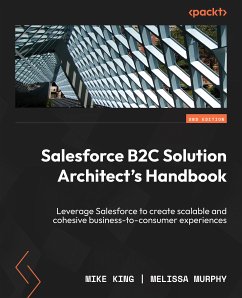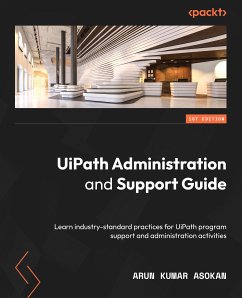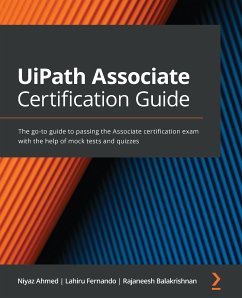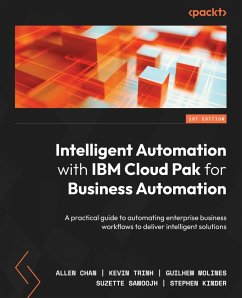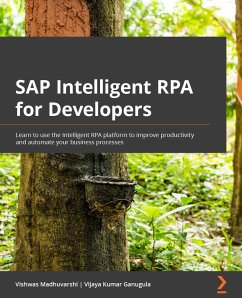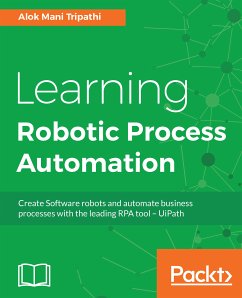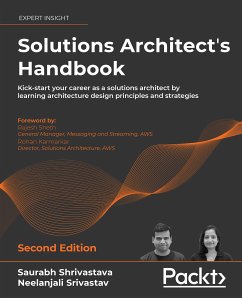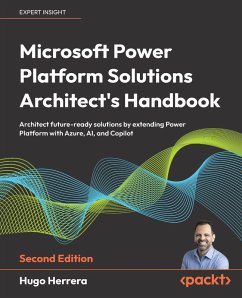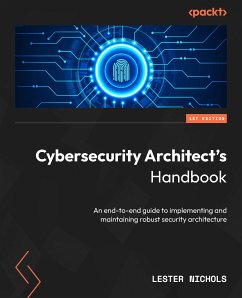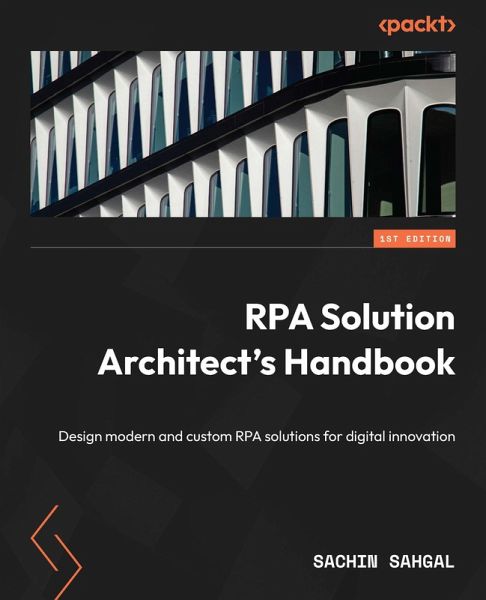
RPA Solution Architect's Handbook (eBook, ePUB)
Design modern and custom RPA solutions for digital innovation

PAYBACK Punkte
0 °P sammeln!
Drive digital transformation by increasing efficiency and ROI for your organization as a robotic process automation (RPA) solution architectPurchase of the print or Kindle book includes a free PDF eBookKey FeaturesLearn architectural design and analysis of enterprise-wide RPA systems with real-world use casesExplore tips and best practices to deliver scalable business outcomes through RPA implementationOvercome challenges in intelligent automation, data, and security while building RPA solutionsBook DescriptionRPA solution architects play an important role in the automation journey and initiat...
Drive digital transformation by increasing efficiency and ROI for your organization as a robotic process automation (RPA) solution architect
Purchase of the print or Kindle book includes a free PDF eBook
Key Features
Learn architectural design and analysis of enterprise-wide RPA systems with real-world use cases
Explore tips and best practices to deliver scalable business outcomes through RPA implementation
Overcome challenges in intelligent automation, data, and security while building RPA solutions
Book Description
RPA solution architects play an important role in the automation journey and initiatives within the organization. However, the implementation process is quite complex and daunting at times. RPA Solution Architect's Handbook is a playbook for solution architects looking to build well-designed and scalable RPA solutions.
You'll begin by understanding the different roles, responsibilities, and interactions between cross-functional teams. Then, you'll learn about the pillars of a good design: stability, maintainability, scalability, and resilience, helping you develop a process design document, solution design document, SIT/UAT scripts, and wireframes. You'll also learn how to design reusable components for faster, cheaper, and better RPA implementation, and design and develop best practices for module decoupling, handling garbage collection, and exception handling. At the end of the book, you'll explore the concepts of privacy, security, reporting automated processes, analytics, and taking preventive action to keep the bots healthy.
By the end of this book, you'll be well equipped to undertake a complete RPA process from design to implementation efficiently.
What you will learn
Understand the architectural considerations for stability, maintainability, and resilience for effective RPA solution design
Interact with cross-functional teams for seamless RPA implementation
Write effective RPA documentation, non-functional requirements, and effective UAT scripts
Demo RPA solutions, receive feedback, and triage additional requirements based on complexity, time, and cost
Design considerations for intelligent automation and learn about RPA as a service
Explore best practices for decoupling, handling garbage collection, and exception handling
Who this book is for
This book is for RPA developers, RPA Sr. developers, or RPA analysts looking to become RPA solution architects. If you are an RPA solution architect, then this book can help you advance your understanding and become more efficient. Familiarity with RPA documentation like SDD, and PDD along with hands-on experience with either one or more RPA tools will be helpful but is not mandatory.
Purchase of the print or Kindle book includes a free PDF eBook
Key Features
Learn architectural design and analysis of enterprise-wide RPA systems with real-world use cases
Explore tips and best practices to deliver scalable business outcomes through RPA implementation
Overcome challenges in intelligent automation, data, and security while building RPA solutions
Book Description
RPA solution architects play an important role in the automation journey and initiatives within the organization. However, the implementation process is quite complex and daunting at times. RPA Solution Architect's Handbook is a playbook for solution architects looking to build well-designed and scalable RPA solutions.
You'll begin by understanding the different roles, responsibilities, and interactions between cross-functional teams. Then, you'll learn about the pillars of a good design: stability, maintainability, scalability, and resilience, helping you develop a process design document, solution design document, SIT/UAT scripts, and wireframes. You'll also learn how to design reusable components for faster, cheaper, and better RPA implementation, and design and develop best practices for module decoupling, handling garbage collection, and exception handling. At the end of the book, you'll explore the concepts of privacy, security, reporting automated processes, analytics, and taking preventive action to keep the bots healthy.
By the end of this book, you'll be well equipped to undertake a complete RPA process from design to implementation efficiently.
What you will learn
Understand the architectural considerations for stability, maintainability, and resilience for effective RPA solution design
Interact with cross-functional teams for seamless RPA implementation
Write effective RPA documentation, non-functional requirements, and effective UAT scripts
Demo RPA solutions, receive feedback, and triage additional requirements based on complexity, time, and cost
Design considerations for intelligent automation and learn about RPA as a service
Explore best practices for decoupling, handling garbage collection, and exception handling
Who this book is for
This book is for RPA developers, RPA Sr. developers, or RPA analysts looking to become RPA solution architects. If you are an RPA solution architect, then this book can help you advance your understanding and become more efficient. Familiarity with RPA documentation like SDD, and PDD along with hands-on experience with either one or more RPA tools will be helpful but is not mandatory.
Dieser Download kann aus rechtlichen Gründen nur mit Rechnungsadresse in A, B, BG, CY, CZ, D, DK, EW, E, FIN, F, GR, H, IRL, I, LT, L, LR, M, NL, PL, P, R, S, SLO, SK ausgeliefert werden.




